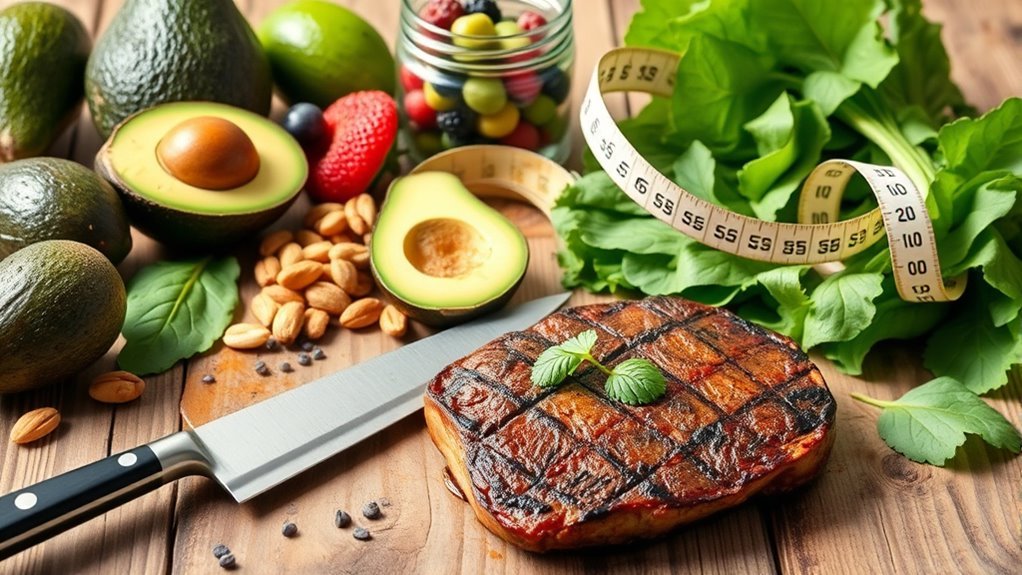To start the Keto diet, focus on reducing carbs while increasing healthy fats and moderate protein. Include foods like avocados, nuts, fish, and leafy greens while avoiding high-carb snacks, sugary drinks, and starchy vegetables. Meal prep is key for success; prepare meals in advance to keep cravings at bay. Stay hydrated and consider electrolyte intake to ease the shift into ketosis. Staying informed about common challenges can help you stay on track as you begin your journey.
Understanding the Keto Diet Concept

The ketogenic diet, often referred to as keto, is a low-carbohydrate, high-fat eating plan designed to shift your body into a state of ketosis. Understanding its history can help dispel common keto diet misconceptions. Initially developed in the 1920s for epilepsy treatment, the diet gained popularity for weight loss and metabolic health. Many believe it means eating unlimited fats or that it’s unsustainable, but that’s not entirely true. Balance is key; healthy fats should replace carbs, not simply be consumed in excess. You’ll likely find that with proper guidance, keto can offer you more freedom in food choices than traditional diets. By approaching it with knowledge, you can embrace this lifestyle in a way that aligns with your goals.
Benefits of Following a Keto Diet

While commencing on a keto diet, you might discover several compelling benefits that can enhance your overall health and well-being. Many people experience significant weight loss, improved energy levels, and mental clarity. The diet can also help with appetite control and blood sugar stabilization. Additionally, reduced inflammation can lead to better heart health and improved digestion.
| Benefit | Description |
|---|---|
| Weight Loss | Effective fat-burning process |
| Mental Clarity | Enhanced cognitive function |
| Energy Levels | Sustained energy throughout the day |
| Reduced Inflammation | Lowered risk of chronic diseases |
With muscle preservation and enhanced endurance, adopting a keto diet may provide the freedom and vitality you’re seeking in your health journey.
Foods to Include in Your Keto Meal Plan

When crafting your keto meal plan, including a variety of nutrient-dense foods is crucial for success. This guarantees you’re getting the right balance of nutrients while enjoying your meals. Here are some key categories to focus on:
- Healthy Fats: Avocado, olive oil, and coconut oil provide energy and support ketosis.
- Protein Sources: Choose meats, eggs, and fish for muscle maintenance and satiety.
- Low Carb Vegetables: Leafy greens, broccoli, and zucchini are great for vitamins and minerals without the carbs.
- Keto Friendly Snacks: Nuts, cheese, and nut butter can satisfy cravings and keep you on track.
Experiment with cooking methods and flavor enhancers to make your meals enjoyable while practicing portion control. Embrace the freedom of variety!
Foods to Avoid on a Keto Diet
To successfully maintain a keto diet, it’s essential to steer clear of certain foods that can disrupt your body’s ability to enter and stay in ketosis. Here’s a quick guide on what to avoid:
| Food Category | Examples | Why to Avoid |
|---|---|---|
| High Carb Snacks | Chips, crackers | High in carbs, disrupts ketosis |
| Sugary Beverages | Soda, sweetened tea | Packed with sugar alternatives |
| Starchy Vegetables | Potatoes, corn | High in carbs, affects blood sugar |
Additionally, watch out for processed foods, grains and legumes, unhealthy fats, low-fat products, and sweetened dairy. These can hinder your keto journey and keep you from feeling your best. Stay mindful, and freedom in your dietary choices will follow!
Meal Prep Tips for Keto Success
To succeed on the keto diet, meal prep is key, so knowing essential keto ingredients can make your shopping easier. Implementing batch cooking strategies not only saves time but also guarantees you always have compliant meals on hand. Additionally, effective storage and organization tips can help you stay on track and reduce food waste.
Essential Keto Ingredients
While starting on a keto diet can seem intimidating, having the right ingredients on hand makes meal prep smoother and more enjoyable. Here’s a list of essential keto ingredients to stock up on:
- Protein sources: Think chicken, fish, and eggs to stay satisfied.
- Cooking fats: Olive oil, coconut oil, and butter are great for flavor and healthy fats.
- Pantry staples: Stock up on almond flour, chia seeds, and low-carb sweetener options for baking and snacks.
- Flavor enhancers: Don’t forget essential oils, herbs, and spices to make your meals exciting.
With these essentials in your kitchen, you’ll be well on your way to creating delicious keto snacks and meal replacements while enjoying the freedom of this lifestyle.
Batch Cooking Strategies
Having the right ingredients is just the beginning of successfully following a keto diet. Batch cooking can be your best ally in ensuring you stick to meal planning without feeling restricted. Dedicate a few hours each week to prepare keto-friendly meals in bulk; this way, you’ll have ready-to-eat options that cater to your lifestyle. Start with versatile proteins like chicken or beef, and incorporate low-carb vegetables to create diverse meals. You can also make keto-friendly snacks in advance, ensuring you’re never caught off guard with unhealthy choices. By organizing your meals in advance, you gain the freedom to enjoy your keto journey without the stress of daily cooking. Embrace batch cooking, and enjoy the benefits of thoughtful meal planning!
Storage and Organization Tips
Effective storage and organization can make all the difference in your keto meal prep success. By optimizing your kitchen organization and food storage, you can streamline your cooking process and reduce waste. Here are some essential tips to get you started:
- Label containers: Clearly mark your meal prep containers with dates and ingredients to avoid confusion.
- Use clear storage bins: Transparent bins let you see what you have at a glance, making it easier to grab what you need.
- Organize by category: Keep meats, veggies, and snacks in separate areas to simplify meal assembly.
- Freeze portions: Portion out meals and snacks for easy access and to maintain freshness longer.
These strategies will empower you to embrace your keto journey with confidence and ease!
How to Transition Into Ketosis
Shifting into ketosis requires a strategic approach to your diet. You’ll need to reduce your carbohydrate intake considerably while increasing healthy fats to fuel your body. Staying hydrated is also vital, as it can help manage the side effects often associated with this dietary change.
Reduce Carbohydrate Intake
Reducing your carbohydrate intake is an essential step in shifting into ketosis, the metabolic state where your body burns fat for fuel instead of carbs. To effectively lower your carb consumption, consider these strategies:
- Start carb counting: Track your daily intake to guarantee you’re staying within your target range.
- Choose low carb snacks: Opt for options like nuts, cheese, or veggies with dip instead of high-carb alternatives.
- Eliminate sugary drinks: Replace sodas and juices with water or unsweetened beverages.
- Read labels: Be mindful of hidden carbs in packaged foods to avoid accidental intake.
Increase Healthy Fats
As you shift your focus to a ketogenic diet, increasing your intake of healthy fats is essential for successfully entering ketosis. Emphasizing healthy fat sources like avocados, olive oil, nuts, and fatty fish can help you achieve your goals. These fats not only provide energy but also support overall health. Explore fat-rich recipes, such as creamy avocado salads or coconut curry soups, to make your meals enjoyable and satisfying. Incorporating these ingredients will not only enhance the flavor of your dishes but also keep you fuller for longer, reducing cravings for carbohydrates. Remember, the key is to prioritize quality fats while enjoying the freedom that comes with a ketogenic lifestyle. Embrace this change and let your body adapt to burning fat for fuel.
Stay Hydrated Daily
Staying hydrated is essential when you’re moving into ketosis. As your body shifts, it tends to lose water and electrolytes, which can lead to fatigue and headaches. To maintain your hydration and electrolyte balance, follow these hydration tips:
- Drink Water Regularly: Aim for at least 8-10 cups daily to support your body’s needs.
- Incorporate Electrolyte-Rich Foods: Avocados, leafy greens, and nuts can help replenish lost minerals.
- Consider Electrolyte Supplements: Products containing sodium, potassium, and magnesium can be beneficial, especially during the initial phase.
- Monitor Your Urine Color: Pale yellow indicates good hydration; darker shades suggest you need more fluids.
Common Challenges and How to Overcome Them
While commencing a keto diet can be exciting, it’s essential to recognize that you may encounter several challenges along the way. Keto cravings can emerge, especially in social situations or during dining out. To combat meal boredom, focus on meal variety—experiment with food swaps to keep things interesting. It’s also important to maintain portion control and track your food intake to avoid nutrient deficiencies. Emotional eating can sneak up on you; understanding your triggers is significant. When you’re feeling overwhelmed, remind yourself that these challenges are temporary. With the right strategies, like planning meals ahead and staying connected with like-minded individuals, you can navigate these obstacles and enjoy the freedom that comes with a successful keto lifestyle.
Staying Motivated on Your Keto Journey
Overcoming challenges in your keto journey often means finding ways to stay motivated. Here are some effective keto motivation tips to keep you on track:
- Set Realistic Goals: Break down your weight loss or health goals into smaller, achievable milestones.
- Track Your Progress: Keep a journal or use an app to monitor your food intake and physical changes.
- Find Accountability Partners: Connect with friends or online communities who share your keto journey for encouragement and support.
- Celebrate Non-Scale Victories: Recognize improvements in your energy levels, mood, or fitness, not just the number on the scale.
Staying motivated is essential for long-term success, so embrace these strategies to maintain your freedom and enthusiasm on your keto path.
Frequently Asked Questions about Starting the Keto Diet
What is the keto diet?
The ketogenic (keto) diet is a low-carbohydrate, high-fat diet that aims to put your body into a state of ketosis. In ketosis, your body becomes highly efficient at burning fat for energy instead of carbohydrates. Typically, the diet consists of about 70-75% fat, 20-25% protein, and only 5-10% carbohydrates. This shift in macronutrient ratios can help with weight loss, improve mental clarity, and provide sustained energy levels.
How do I start the keto diet?
To start the keto diet, follow these steps:
- Determine your daily caloric needs and macronutrient ratios (typically 70-75% fat, 20-25% protein, 5-10% carbs).
- Plan your meals around keto-friendly foods such as avocados, nuts, seeds, fatty fish, low-carb vegetables, and oils.
- Gradually reduce your carbohydrate intake to avoid a sudden shift that can lead to side effects known as the “keto flu.”
- Stay hydrated and consider adding electrolytes to your diet as your body adjusts.
- Monitor your progress and adjust your diet as needed to maintain ketosis.
What foods should I avoid on a keto diet?
On a keto diet, you should avoid foods high in carbohydrates, including:
- Grains and starches like bread, pasta, rice, and corn.
- High-sugar foods such as candy, desserts, and sugary beverages.
- Fruits that are high in sugar, like bananas, grapes, and apples.
- Starchy vegetables such as potatoes and sweet potatoes.
- Processed foods that often contain hidden sugars and carbs.
What are the potential side effects of starting a keto diet?
When starting a keto diet, some people may experience side effects known as the “keto flu.” This can include symptoms such as fatigue, headache, dizziness, nausea, irritability, and difficulty sleeping. These symptoms typically occur during the initial transition period when your body is adjusting to burning fat for fuel instead of carbohydrates. To alleviate these symptoms, ensure you stay well-hydrated, replenish electrolytes, and consider a gradual transition into the diet rather than a sudden cut in carbs.
Can I exercise while on a keto diet?
Yes, you can exercise while on a keto diet, but you may need to adjust your workout routine as your body adapts to using fat for fuel. Initially, you might experience a dip in energy levels or performance, but many people find that their endurance improves over time. Focus on low to moderate-intensity exercises like walking, cycling, and weight training. It’s important to listen to your body and ensure you’re consuming enough calories and nutrients to support your activity level.
References
- https://www.who.int/news-room/fact-sheets/detail/healthy-diet
- https://www.ncbi.nlm.nih.gov/pmc/articles/PMC6460167/
- https://www.health.harvard.edu/staying-healthy/the-low-carb-diet
- https://www.cdc.gov/healthyweight/healthy_eating/index.html
- https://www.ketodietapp.com/Blog
- https://www.mayoclinic.org/healthy-lifestyle/nutrition-and-healthy-eating/in-depth/keto-diet/art-20459899
- https://www.verywellfit.com/what-is-the-keto-diet-5191663
- https://www.nhlbi.nih.gov/health-topics/healthy-eating
- https://www.nutrition.gov/topics/dietary-approaches/keto-diet
- https://www.bbc.co.uk/news/health-51094388


